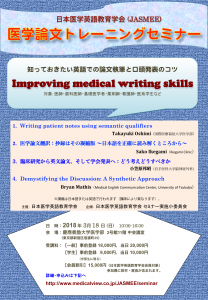日本医学英語教育学会主催 医学英語セミナー
知っておきたい英語での論文執筆と口頭発表のコツ
Improving Medical Writing Skills
対象: 医師・歯科医師・基礎医学者・薬剤師・看護師・医系学生など
開催概要
| 日時: | 2018年3月18日 (日) 10:00~ 16:00 |  Poster (PDF) Poster (PDF) |
| 会場: | 慶應義塾大学医学部 2号館11階 中会議室 (東京都新宿区信濃町35)http://www.med.keio.ac.jp/access/ |
|
| 受講料: | [一般]事前登録 18,000円,当日 20,000円
[学生]事前登録 9,000円,当日 10,000円 (学部生に限る) [会員割引]15,000円(日本医学英語教育学会会員対象) 参加費に教材・昼食が含まれます。 |
|
| 受講人数: | 50名(先着順) |
プログラム
1. |
Writing patient notes using semantic qualifiers
|
2. |
医学論文翻訳:抄録はその凝縮版~日本語を正確に読み解くところから~[講師]Sako Ikegami (Ikegami Clinic) Why translation skills? To publish in any major medical journal, you will need to prepare an English abstract. Ideally, you’ll write it in English, but many authors just translate their Japanese version. Translating a structured abstract will provide experience that can be extrapolated to full-length articles. |
3. |
臨床研究から英文論文、そして学会発表へ:どう考えどうすべきか[講師]小笠原邦昭(岩手医科大学脳神経外科) 臨床医が臨床研究を行う理由は、「現在われわれが日常臨床で用いている知識、検査法、技術等はすべて先人の基礎的臨床的研究の上に成り立っているもので、第一線の臨床医が臨床研究をしないということは医学の遅滞につながる」からである。研究成果を論文にしなければならない理由は2つあり、「真に臨床に役立つ成果であれば、世に出さなければ多くの患者さんが迷惑する(臨床医の義務)」と「自分の考えが正しいかどうか世の中に問う(臨床医の権利)」にある。では、論文を書けばなにか自分にいいことがあるのかという問いには「1. 科学的かつ客観的、論理的にものを 見る目が養われる」「2. 手術をはじめとした臨床は、すべてに理屈がある→論文を書くと臨床能力が上がり、手術もうまくなる」と答えたい。 |
4. |
Demystifying the Discussion: A Synthetic Approach[講師]Bryan Mathis(Medical English Communications Center, University of Tsukuba) DISCUSSIONを明らかにするため:統合的取り組み Summary: A true scientific discussion acknowledges prior art, reviews shortcomings that drive the quest for the reported research, explicitly states a question, discusses the results in a manner that addresses the depth and breadth of the entire body of literature AND wraps well-crafted conclusions into a package that also self-reports limitations and hints at future work. This talk will cover each of the essential parts of a discussion from the perspective of synthesizing them into a cogent and presentable work that serves as the keystone to acceptance by high impact journals. Discussions of common mistakes will also be held. |
※講義は日本語または英語で行われます(講師により異なります)。
申込方法
受講を希望される方は、下記の手順にてお申し込みください。
- 受講申込フォームにお進みいただき、所定欄に入力後、送信してください。
- ご入力いただいたメールアドレスに「仮受付通知」が送信されますので、ご確認ください。
- 「仮受付通知」に記載の方法で、受講料をお振り込みください。
お問合せ
お問合せフォームからご連絡ください。
個人情報の取り扱いについて
本セミナーを受講される方の個人情報については、セミナーの実施のためにのみ使用いたします。また、セミナーを運営する必要最小限の担当者のみが個人情報を取り扱い、第三者への開示・提供はいたしません。
